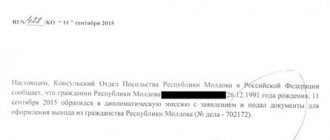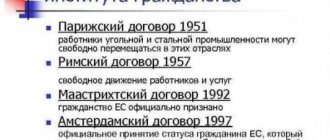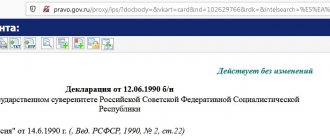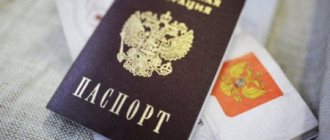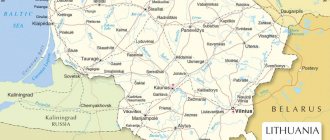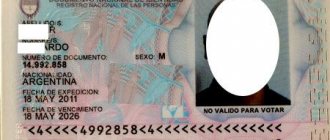Students (both current and former) are one of the categories of foreigners who have privileges when obtaining Russian citizenship. Studying at a Russian university as a “ticket” to the country, although it does not completely simplify the procedure, is, for example, a chance to avoid testing for language proficiency. In this material, we will find out how a student can obtain Russian citizenship, and also dwell on the features and pitfalls of this process.
Acquiring Russian citizenship
Getting there is the goal of many international students. According to the Law “On Citizenship of the Russian Federation” dated May 31, 2002 No. 62-FZ, any citizen can do this subject to the conditions specified in the normative act in two ways:
- on a universal basis;
- in a simplified form.
The main distinguishing feature of acquiring citizenship on a general basis is the requirement of continuous residence in the Russian Federation for more than 5 years from the date of receipt. It is also necessary to follow the scheme for obtaining marks (documents) “—residence permit—passport.”
Simplified form of receipt
The simplified procedure for obtaining Russian citizenship implies a “softening” of the requirements of the general procedure (we are talking about reducing the minimum period of residence). The basis for this may be, for example, for students whose parents are in (or the former USSR).
Also, the privileges of a simplified option for obtaining Russian citizenship are provided:
- for those born or living in the former USSR;
- for relatives of Russian citizens (children, spouses, parents);
- for graduates of Russian universities, but only if their diploma was received no earlier than July 1, 2002;
- for disabled people, participants of the Second World War;
- for Russian military personnel for 3 years;
- For ;
- for persons who have special services to the Russian Federation.
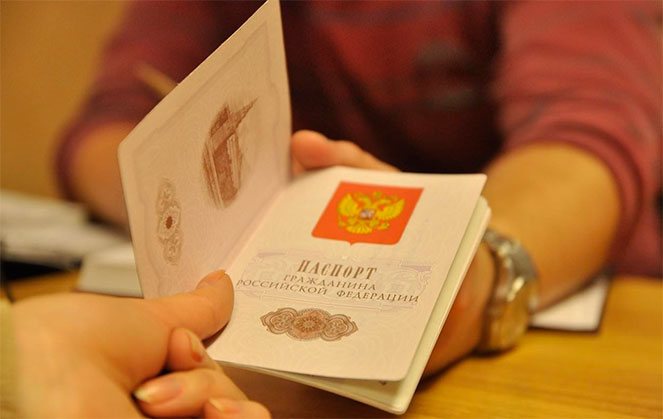
How to get into the simplified corridor for students: practical tips
The Russian Federation, like any other state, is interested in highly qualified specialists, therefore it does its best to attract citizens of other countries to universities, who in the future become full members of society and work for the benefit of the domestic economy.
Before a foreign student obtains Russian citizenship, it is logical to assess the need for personnel of various specializations in the regions of Russia and choose the current specialty. It is important to remember that graduating from a private university does not guarantee passage through the “green corridor”.
The choice of educational institution must be approached especially carefully; it must have state accreditation to conduct educational activities, but about a private university it is necessary to clarify further.
A separate issue is the requirement of three years of work experience in the specialty at Russian enterprises. It is much more difficult for full-time students to purchase it than for part-time students. Therefore, already from the first year, it is important to take a closer look at potential employers and, if you plan to obtain Russian citizenship with a diploma.
To confirm his income, a foreigner who has received a Russian education provides either a certificate from his place of work or a document from the bank confirming the availability of the amount necessary for living, which is an additional argument in favor of finding an employer while still studying. Even full-time students have the right to this, for example, during the holidays.
More information about the requirements for candidates
Until 2021, only a certificate of professional education was already the basis for an application for citizenship, while the candidate could apply immediately for permanent residence (bypassing temporary residence permit and residence permit), which preceded obtaining citizen status.
After amendments were made to the Russian legislative framework, a list of requirements for foreign students applying for citizenship “by education” and their diplomas was developed.
The simplified system will “work” if several conditions are met:
- the applicant holds a Russian diploma issued no earlier than July 1, 2002 (for students still studying, this is a certificate from the university);
- the person has 3 years or more experience in the profession (at the time of writing the application);
- The university that issued the certificate is state (if the training was carried out at a private university, it is better to clarify the details with employees of the Main Directorate for Migration of the Ministry of Internal Affairs of the Russian Federation).
Obtaining Russian citizenship for a student from Kazakhstan
What documents must be submitted for a student born in 1997? with Kazakhstani citizenship, studying at a Russian university to obtain citizenship? When can I receive it? Do I need to apply for temporary registration or a residence permit before this? If yes, what documents are required. If one of the parents has a residence permit of the Russian Federation, is it possible to obtain citizenship in a simplified manner?
As a general rule, before the right to acquire Russian citizenship arises, you must first obtain a temporary residence permit in the Russian Federation, then a residence permit. Provided you are legally present on the territory of the Russian Federation, you should submit an application for a temporary residence permit in the Russian Federation (TRP) to the migration service department at your place of residence. A temporary residence permit is issued for a period of three years. Having lived in the Russian Federation on the basis of a temporary residence permit for one year, a foreign citizen has the right to apply for a residence permit. After receiving a residence permit, you gain the right to apply for Russian citizenship. The procedure and conditions for obtaining citizenship of the Russian Federation are regulated by the Federal Law of the Russian Federation “On Citizenship of the Russian Federation” dated May 31, 2002 No. 62-FZ (hereinafter referred to as Law No. 62-FZ), the Regulations on the procedure for considering issues of citizenship of the Russian Federation, approved by the Decree of the President of the Russian Federation dated November 14. 2002 No. 1325. Law No. 62-FZ provides for various grounds for acquiring Russian citizenship, incl. general and simplified procedure for admission to citizenship of the Russian Federation. Foreign citizens have the right to apply for admission to citizenship of the Russian Federation in the general manner, provided that these citizens and persons, in particular, reside on the territory of the Russian Federation from the day they receive a residence permit until the day they apply for admission to citizenship of the Russian Federation in for five years continuously. The grounds for admission to citizenship of the Russian Federation in a simplified manner are determined by Article 14 of the Federal Law of May 31, 2002 N 62-FZ “On Citizenship of the Russian Federation”. Thus, foreign citizens and stateless persons who have reached the age of eighteen years and have legal capacity have the right to apply for admission to citizenship of the Russian Federation in a simplified manner without complying with the conditions provided for in paragraph “a” of part one of Article 13 of the Federal Law, if these citizens and persons received, after July 1, 2002, professional education in basic professional educational programs that have state accreditation in educational or scientific organizations of the Russian Federation on its territory and carry out labor activities in the Russian Federation for a total of at least three years before the day of applying for admission to citizenship of the Russian Federation. A simplified procedure for admission to Russian citizenship is provided for persons recognized as native speakers of the Russian language. Native speakers of the Russian language are persons who speak Russian and regularly use it in the family, everyday and cultural spheres, if these persons or their relatives in a direct ascending line permanently reside or previously permanently resided in the territory of the Russian Federation or in the territory belonging to The Russian Empire or the USSR, within the State border of the Russian Federation. Native speakers of the Russian language can be granted Russian citizenship in a simplified manner. The procedure for obtaining Russian citizenship for native speakers of the Russian language includes: - recognition as a native speaker of the Russian language; — obtaining a residence permit; -admission to citizenship of the Russian Federation.
If a foreign citizen (stateless person) falls under the concept of a native speaker of the Russian language and temporarily stays or resides on the territory of the Russian Federation, then he has the right to apply to the Commission for Recognition of a Foreign Citizen or Stateless Person as a Native Speaker of the Russian Language with an application to recognize him as a native speaker of the Russian language.
An application for recognition of a foreign citizen or stateless person temporarily staying in the territory of the Russian Federation as a native speaker of the Russian language, together with documents, is submitted to the commission no later than 15 days before the expiration of the period of temporary stay in the Russian Federation. An application for recognition of a foreign citizen or stateless person living in the Russian Federation as a native speaker of the Russian language, together with documents, is submitted to the commission no later than 3 months before the expiration of the period of residence in the Russian Federation. A person recognized as a native speaker of the Russian language is required to obtain a residence permit. A residence permit for a native Russian speaker is issued for a period of 3 years. An application for a residence permit in 2 copies is submitted to the territorial divisions of the Federal Migration Service of Russia at the place of residence (stay) of the applicant. Along with the application, a person recognized as a native speaker of the Russian language submits: - an identification document (with a notarized translation); — photographs measuring 35 x 45 mm; - a document from an authorized body of a foreign state confirming the application of this citizen with an application to renounce his existing citizenship of a foreign state, or a document confirming the impossibility of renouncing citizenship of a foreign state (not provided if renunciation of citizenship of a foreign state is not required in cases provided for by an international treaty ); - a document issued by an authorized healthcare institution of the Russian Federation, confirming the absence of drug addiction and infectious diseases that pose a danger to others, as provided for in the list, as well as a certificate of absence of a disease caused by the human immunodeficiency virus (HIV infection).
A state fee is charged for issuing a residence permit.
Foreign citizens and stateless persons permanently residing legally on the territory of the Russian Federation, recognized as native speakers of the Russian language, have the right to apply for admission to the citizenship of the Russian Federation in a simplified manner. In this case, along with the application for acquiring Russian citizenship, it is necessary to submit the following documents: - residence permit; - one of the documents confirming the presence of a legal source of livelihood (certificate of income; personal income tax return with a mark from the tax authority; certificate from the place of work; work book; pension certificate; certificate from the social security authority on receipt of benefits; confirmation of receipt alimony; a certificate of the presence of a deposit in a credit institution indicating the account number; a certificate of the right to inheritance; a certificate of income of the person on whom the applicant is dependent; or another document confirming the receipt of income from activities not prohibited by law); — decision to recognize the applicant as a native speaker of Russian; — a document from an authorized body (certified by an authorized body) of a foreign state, confirming the applicant’s renunciation of the citizenship of that state, or a document confirming the impossibility of renouncing the citizenship of a foreign state due to reasons beyond the applicant’s control. A state fee is charged for admission to citizenship of the Russian Federation.
We advise you to watch
Crossing the border with Ukraine
Entry into Russia for a foreign citizen
Appealing the order of the Ministry of Justice on the undesirability of staying in the Russian Federation
Illegal stay in Russia, permission to enter the territory of the Russian Federation
Published in Citizenship, registration
List of required documents
We have already written in detail.
For those who want to obtain a Russian passport on “educational” grounds, the package of papers includes:
- ;
- and status in the Russian Federation (TRP or residence permit);
- photo;
- tax payment receipt;
- diploma of completed education;
- work book, which contains a record of three years of work experience;
- ;
- work patent;
- passport of the native state and confirmation of renunciation of another citizenship.
As for , students do not provide it, since the diploma itself (or a certificate from the university for current students) is already proof of knowledge at the required level.
All certificates and certificates are submitted in person in the original (copies are taken on site). For documents in another language (except Russian) a translation will be required, for foreign certificates - an apostille.

Conditions for obtaining citizenship
In general, the law provides for obtaining citizenship in a simplified manner for the following categories of persons:
- Persons who are fluent in Russian and reside in Russia on a permanent basis. In this case, you will only need to undergo an interview with a commission;
- Also, if a foreigner’s ancestors lived on the territory of the USSR, he has a greater chance of taking advantage of the simplified procedure;
- Persons who have been married to a citizen of the Russian Federation for more than three years;
- Well, directly the students completing their studies at a Russian university.
The main condition for obtaining citizenship is the renunciation of the previous one. But if a foreigner has citizenship of a country with which the Russian Federation has entered into a corresponding agreement (Belarus, Kazakhstan, Kyrgyzstan), renunciation of citizenship is not required. It is worth noting that sometimes employees of the Ministry of Internal Affairs do not look at this so strictly, so the refusal procedure can be bypassed.
It is necessary to distinguish between the concepts of “dual citizenship” and “two citizenships” - these are not identical definitions. From the point of view of jurisprudence as a science, these are two different legal institutions. Thus, dual citizenship in relation to Russian citizens is valid only in cases where the citizen has two full-fledged, equal citizenships. Two citizenships occur if a person has a passport from two (or more) countries.
Where to go and what to do
Owners (or current recipients) of a Russian diploma who, on its basis, apply for Russian citizenship, submit, together with an application addressed to the President of the Russian Federation, a collected set of documents to the department of the Main Department of Migration of the Ministry of Internal Affairs at the place of registration. If the candidate is abroad, he can contact the Russian diplomatic mission in his country of residence (embassy, consulate).
Migration service authorities or diplomatic missions check the facts and submitted documents and send the latter, along with other documents and their own conclusions on the essence of the issue, to the Commission on Citizenship Issues under the President of the Russian Federation.
The latter conducts its own checks and prepares draft decrees of the President of the Russian Federation on admission to citizenship or refusal of admission.
Stages of obtaining citizenship
- Step one. The first thing you need to do is submit an application in duplicate to the Ministry of Internal Affairs and renounce your previous citizenship. If you live in Tajikistan or Turkmenistan, you do not need to do this, because You are subject to the dual citizenship rule. The application must be accompanied by a residence permit or temporary residence permit, a visa and a migration card, a certificate of proficiency in Russian and a diploma, because It is the acquisition of Russian citizenship on the basis of a diploma that is the decisive factor. Next, you should wait to receive a notification about the possibility of admission to Russian citizenship. The deadline for receipt is three months.
- Step two. Drawing up an application for citizenship according to a simplified procedure. The application is drawn up in Russian, in two copies.
- Step three. A state fee must be paid. The current legislation sets the amount at 3,500 rubles.
- Step four. Contact the Ministry of Internal Affairs at your place of residence with an application, all necessary documents and a receipt confirming payment of the fee.
- Step five. Receive your passport within the established time frame. You will need to wait at least three months, maximum six months.
Payment and terms
For various categories of foreigners, including students, the cost of obtaining the status of a Russian citizen is the same and amounts to 3,500 rubles.
You can read about this in more detail in the material about.
Taking into account the length of time it takes for a package of documents to pass through all authorities, legislators approved a review period of 12 months if the process is carried out on a general basis, or 6 months if processed according to a simplified scheme.
The following categories of applicants will receive a response within 3 months:
- participant of the State program for the resettlement of compatriots;
- those who, or and receive a passport within the framework of the Agreement on a Simplified Procedure for Obtaining Citizenship, signed between these countries and the Russian Federation on February 26, 1999.
We have already written in more detail on what conditions they depend.

Which students will not be accepted as citizens of the Russian Federation?
Holders of a Russian diploma, like other categories of citizens applying for citizenship, are not immune from refusal, most often due to the provision of false information.
In addition, representatives of government agencies may reject the applicant’s application for the following reasons:
- participated in hostilities or extremist movements against Russians;
- appears dangerous due to religious or political views;
- was previously convicted of activities against the Russian state system.
Why does a student need a Russian passport?
A higher education received at a Russian university, under a combination of additional circumstances, can become a ticket to the country for a foreign (no matter whether current or former) student.
The holder of a Russian passport has the right to state-guaranteed medical assistance or training; if, for example, you had to pay money for your first diploma, then in the future the newly minted citizen can retrain for free.
Influencing political life, holding public office, enjoying benefits and receiving benefits is not a complete list of advantages that distinguish a citizen from a foreigner. So the game is worth the candle.
What education do you need to have to apply for citizenship?
For this reason it is not necessary to have a higher education. The law uses the wording “received... vocational education in basic vocational educational programs.” In Russia, the main professional educational programs include:
- Primary vocational education programs are vocational schools and lyceums;
- Secondary vocational education programs are technical schools and colleges;
- Higher professional education - institutes, academies, universities;
- Postgraduate professional education - postgraduate studies, doctoral studies.
It turns out that a foreign citizen who has one year of work experience in the Russian Federation and education received both at a Russian university and at a college, lyceum or school has the right to apply for Russian citizenship in a simplified manner.
